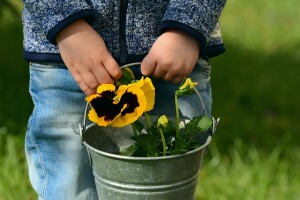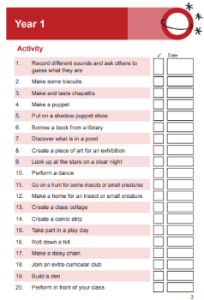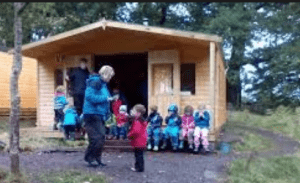
by Kathryn Solly
(reprinted by kind permission of Early Education)
 My whole career has been based on play and learning outside in all weathers. From the beginning as a primary/secondary trained teacher in Papua New Guinea I learnt to deal with weather – there it was humidity, tropical rain and strong sun. The remainder of my career has included working in a primary school as an infant teacher running an Environmental Studies centre which included over 80 forms of wildfowl and two crocodiles, but that’s another story!
My whole career has been based on play and learning outside in all weathers. From the beginning as a primary/secondary trained teacher in Papua New Guinea I learnt to deal with weather – there it was humidity, tropical rain and strong sun. The remainder of my career has included working in a primary school as an infant teacher running an Environmental Studies centre which included over 80 forms of wildfowl and two crocodiles, but that’s another story!
I have also worked in a Pupil Referral Unit often taking troubled young people out and about in the outdoors. It was this challenging experience which decided my career change to early childhood so I retrained as a nursery teacher. Every early childhood post I have held included an outside area that was in need of redevelopment in order to provide the maximum benefits for the children who used it. In each case an inclusive learning environment was paramount and thus a unique design was essential.
 Gardens and outdoor environments present unique possibilities and challenges as has been recognised over time and particularly celebrated by the likes of Margaret McMillan and Susan Sutherland Isaacs in the 1920s and 1930s. As I have gone on to train, present, consult and write about outdoors I am always fascinated about the ways that we can use them in all weathers. The children themselves often are quick to see the magical possibilities of slopes, walls, fences, rocks, bumps and hollows as well as any natural growth such as bushes and trees. Lady Allen of Hurtwood recognised this ability in her mission to create adventure playgrounds in cities from the 1950s onwards.
Gardens and outdoor environments present unique possibilities and challenges as has been recognised over time and particularly celebrated by the likes of Margaret McMillan and Susan Sutherland Isaacs in the 1920s and 1930s. As I have gone on to train, present, consult and write about outdoors I am always fascinated about the ways that we can use them in all weathers. The children themselves often are quick to see the magical possibilities of slopes, walls, fences, rocks, bumps and hollows as well as any natural growth such as bushes and trees. Lady Allen of Hurtwood recognised this ability in her mission to create adventure playgrounds in cities from the 1950s onwards.
Young children also learn so much from the weather and its variance. Thunder and lightning may well frighten them, which is not a bad thing as this is really the only weather to be wary and wise with in terms of hazard in our UK climate. Rain, frost, fog, snow and sun, whilst not without potential hazards also offer huge possibilities for the young child. Think about the first time they
- see and taste snow
- make marks in frost
- splash in puddles
- observe their shadow on a bright winter day
- or sit still in the shade of a tree in the middle of summer
 These are all life experiences which form sensorial impressions on the body and mind. Our personal, human reactions in turn quickly influence the experiences of seeing heavy rain, of a very hot or very cold day as positive or negative. As role-models, I believe that adults must be prepared both physically in terms of clothing but also mentally to laugh off getting wet, hot, cold etc and act professionally.
These are all life experiences which form sensorial impressions on the body and mind. Our personal, human reactions in turn quickly influence the experiences of seeing heavy rain, of a very hot or very cold day as positive or negative. As role-models, I believe that adults must be prepared both physically in terms of clothing but also mentally to laugh off getting wet, hot, cold etc and act professionally.
 The recent Activity Passports published by the DfE I believe could really benefit many children with a downloadable list of things to do for schools and parents outside by widening their curriculum. However, in my opinion, the list misses the value of the uniqueness of early childhood experiences and possibilities, as well as having financial implications and cultural relevance for ALL families. I really wonder if in early childhood, in school reception and key stage one, children with their endless curiosity and energy need this “bucket list”.
The recent Activity Passports published by the DfE I believe could really benefit many children with a downloadable list of things to do for schools and parents outside by widening their curriculum. However, in my opinion, the list misses the value of the uniqueness of early childhood experiences and possibilities, as well as having financial implications and cultural relevance for ALL families. I really wonder if in early childhood, in school reception and key stage one, children with their endless curiosity and energy need this “bucket list”.
This is not about me wishing to deprive younger and more vulnerable children but it is about following the unique child and their motivation and interests in a developmentally appropriate way and through natural occurrence. Whilst every child should gain experience of such important aspects of life such as where our food comes from, until they have experienced the elements such as earth, weather, water and fire, they really do not have a sensorial base of experience. This has been recognised since the early pioneers such as Froebel, Steiner and Montessori.
These types of experience are far from complicated, expensive or large scale. Short local walks in parks, woodland and open spaces elicit questions from naturally observant children being out and about in their community. The children, like the adults, need to be warm and dry in winter, spring and autumn and sun-safe in summer: the provision of suitable clothing for this to happen is essential so that no child is excluded.
 Families have different life experiences and those who have come from different parts of the globe may be more familiar with winter’s challenges or the endless heat of the southern summer sun. It is not surprising then that those who have come from northern climes may wish to expect their child to play outside in temperatures much colder than we might. Others families might choose to wrap their child in numerous layers on the first frosty morning having only had experience of sunshine and much warmer weather. Sometimes children can be over protected by very well-meaning parents when it comes to outdoor experiences. These families need careful nurturing, conversation and trust in the potential of outdoors so that all children are involved.
Families have different life experiences and those who have come from different parts of the globe may be more familiar with winter’s challenges or the endless heat of the southern summer sun. It is not surprising then that those who have come from northern climes may wish to expect their child to play outside in temperatures much colder than we might. Others families might choose to wrap their child in numerous layers on the first frosty morning having only had experience of sunshine and much warmer weather. Sometimes children can be over protected by very well-meaning parents when it comes to outdoor experiences. These families need careful nurturing, conversation and trust in the potential of outdoors so that all children are involved.
Many years ago I remember visiting Reggio Emilia in May. I wore a t-shirt but children in schools were still in jackets and were not allowed outside as parents feared bronchial conditions. Culture matters, and we must respect it alongside working with families to show them the benefits of outdoors, whilst communicating and explaining the research that supports these essential life opportunities. Parents often, in my experience, quickly grasp the benefits to their child’s health of such things as:
- enhanced immunity
- enhanced bone density and Vitamin D levels
- reduced myopia
- improved concentration and attention
- better mental wellbeing
- improved sleep
- improved co-ordination and physicality
- opportunities to master skills not feasible indoors
- improved energy and enhanced opportunities for movement
- reduction in cases of obesity, diabetes etc.
- enhanced interpersonal skills and negotiation
- build strong attachments to places and people
- gain a moral understanding and awe of the importance of nature
- gain a symbolic inspiration from the world around for imaginative and creative exploration and learning
- chances to make sense of and learn more about many concepts which underpin learning for life such as gravity, speed, gradient, life, death, reproduction and excretion.
Understanding these benefits and seeing or hearing about their children enjoying outside usually helps any worries or anxieties to disappear. The use of photographs or video excerpts of play alongside evident progress will also help. It helps to remember too that any particularly cautious adult or parent may have experienced something very traumatic or dangerous outdoors, possibly involving weather, so supportive and trusting, gradual approaches will be very beneficial. Talking and open communication over time will help reassure and change minds alongside clear and shared policies and procedures for illness, accidents and risk benefit assessment. Including parents, staff and adults in events and aspects of outdoor play and learning also grows confidence as they are often then naturally inspired and led by their child’s enthusiasm, and their awe and wonder.
I believe that we must think “and” rather than “or” when having difficult conversations about the value of outside learning. I think that it is important to consider that regardless of how limited, tiny, or challenging children’s access to outdoors is, how much more being outside in all weathers gives them. Therefore, the layout of the external environment must  also consider the impact of weather. There are a few children and even fewer adults in my experience who truly relish being outside all day in damp, cold January/February weather. With climate change and hotter summers consideration of some sort of shelter, sail or lean-to structures are wise if financially and spatially feasible. This means there is somewhere where one can retreat to for health and safety reasons as well as providing a type of half-way house for children who are taking their first few taste of playing outdoors.
also consider the impact of weather. There are a few children and even fewer adults in my experience who truly relish being outside all day in damp, cold January/February weather. With climate change and hotter summers consideration of some sort of shelter, sail or lean-to structures are wise if financially and spatially feasible. This means there is somewhere where one can retreat to for health and safety reasons as well as providing a type of half-way house for children who are taking their first few taste of playing outdoors.
 Special experiences such as learning to use a fire bowl to cook tiny new potatoes (or dare I suggest it, marshmallows on sticks) are fun and invaluable for young children. When this is done in the darkness of late winter afternoons this can lead to magical discussions about the moon, stars and the universe. Equally, making and flying a simple kite really provides an in-depth experience of the power and vagaries of the wind. Reading stories about being outside in all weathers and establishing simple provision such as a mud kitchen or a sand pit can also enhance children’s experiences, value and fun of weather. Starting with the unique child and their fascinations is a sound start.
Special experiences such as learning to use a fire bowl to cook tiny new potatoes (or dare I suggest it, marshmallows on sticks) are fun and invaluable for young children. When this is done in the darkness of late winter afternoons this can lead to magical discussions about the moon, stars and the universe. Equally, making and flying a simple kite really provides an in-depth experience of the power and vagaries of the wind. Reading stories about being outside in all weathers and establishing simple provision such as a mud kitchen or a sand pit can also enhance children’s experiences, value and fun of weather. Starting with the unique child and their fascinations is a sound start.
This blog was originally written for Early Education. Further related resources are available at www.early-education.org.uk

